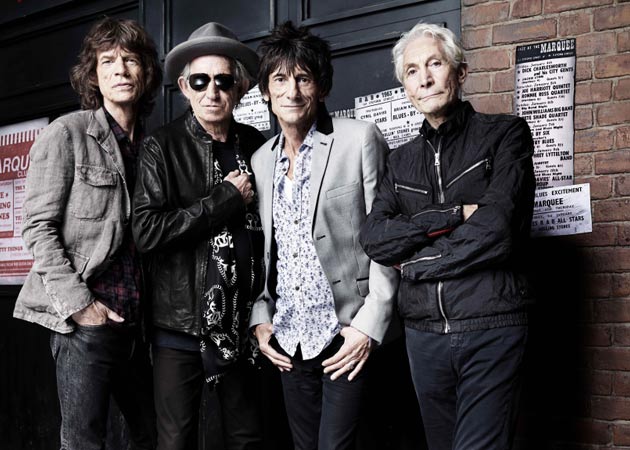
London:
It's only rock 'n' roll, but the Rolling Stones definitely like it. The band celebrated the 50th anniversary of its first gig at a bash in London on Thursday, and despite being well over retirement age, the Stones have no plans to quit.
"All of this has sort of brought us back together, and we'll see what comes out of it," said guitarist Keith Richards, who revealed that the Stones have begun rehearsing for new live shows that could come later this year.
It all means Jagger may need to rethink the words he sang more than 45 years ago in Mother's Little Helper - "What a drag it is getting old."
The group is marking its half-century with no letup in its productivity or rock 'n ' roll style. At 68, Jagger is still the cool, rich frontman of the world's most successful rock band.
Now in their late 60s and early 70s, the band members celebrated the anniversary by attending a retrospective photo exhibition at London's Somerset House.
Jagger, Richards, Ronnie Wood and Charlie Watts mingled with a mixed crowd of rockers, writers and hangers-on - from Simply Red singer Mick Hucknall to playwright Tom Stoppard - at a launch party for the exhibition.

The show, which opens to the public Friday, charts the band's career from their first official photo shoot in 1963 - young mop tops lined up against a row of red phone boxes - to their monster '80s and '90s stadium tours.
"You can see when you look at the photos how we couldn't give a hoot about anything," Jagger said with rock 'n 'roll pride. "You can just sort of tell by the attitude of those photographs how we didn't care."
Jagger spoke to the Associated Press 50 years to the day after the young R&B band played London's Marquee Club. Taking a name from a song by bluesman Muddy Waters, they were billed as The Rollin' Stones -the 'g' came later.
The lineup for the gig was vocalist Jagger, guitarists Richards and Brian Jones, bassist Dick Taylor, pianist Ian Stewart and Mick Avory on drums. Taylor and Avory soon left the lineup, while Stewart switched to a backup role; drummer Watts joined in 1963 and guitarist Wood in 1975.
The band had its first hit, a cover of Chuck Berry's Come On, in 1963, and soon became one of the world's biggest and most influential rock acts, rivaled only by The Beatles.
The Beatles split up in 1970, but the Stones are still going strong - something Jagger attributes in part to an early grounding in versatility.

He said that at that first gig, "the audience was college students having a night out, and they weren't particularly demonstrative, but they appreciated and enjoyed the set. That was our audience, it was more of a college audience, art-school kind of crowd. A few months later we were playing in front of 11 year olds who were screaming at us.
"Even in the very early days, we played to a lot of different kinds of audiences."
Music critic John Aizlewood said the Stones' contribution to rock 'n' roll is "immeasurable."
"They are a founding father of rock music as we know it," he said. "Other bands have tried and not pulled off that amount of sexiness, allied to a kind of street-fighting menace."
Aizlewood said the Rolling Stones have endured where other bands have split because "they are smart enough to put the band ahead of the individuals, despite their collective egos."
He said they are also canny businessmen, and realized early on that "once you get to a certain level, if you maintain your live performance, you can play stadiums forever."

The Stones have sold more than 200 million records, with hits including (I Can't Get No) Satisfaction, Street Fighting Man and You Can't Always Get What You Want.
But in recent years much of their income has come from touring. Their last global tour, "A Bigger Bang," earned more than $500 million between 2005 and 2007.
The band has famously gone through rocky periods. Founding member Brian Jones drowned in his swimming pool in 1969. Jagger and Richards are both creative catalysts and sparring partners. But something - Richards calls it "chemistry" - keeps them going.
"I'd bottle it if I knew what it was," he said.
Band mate Wood agreed.
"When we do get together, no matter what's going on ... something changes and it all channels through and comes out in the music," he said.
"All of this has sort of brought us back together, and we'll see what comes out of it," said guitarist Keith Richards, who revealed that the Stones have begun rehearsing for new live shows that could come later this year.
It all means Jagger may need to rethink the words he sang more than 45 years ago in Mother's Little Helper - "What a drag it is getting old."
The group is marking its half-century with no letup in its productivity or rock 'n ' roll style. At 68, Jagger is still the cool, rich frontman of the world's most successful rock band.
Now in their late 60s and early 70s, the band members celebrated the anniversary by attending a retrospective photo exhibition at London's Somerset House.
Jagger, Richards, Ronnie Wood and Charlie Watts mingled with a mixed crowd of rockers, writers and hangers-on - from Simply Red singer Mick Hucknall to playwright Tom Stoppard - at a launch party for the exhibition.

The show, which opens to the public Friday, charts the band's career from their first official photo shoot in 1963 - young mop tops lined up against a row of red phone boxes - to their monster '80s and '90s stadium tours.
"You can see when you look at the photos how we couldn't give a hoot about anything," Jagger said with rock 'n 'roll pride. "You can just sort of tell by the attitude of those photographs how we didn't care."
Jagger spoke to the Associated Press 50 years to the day after the young R&B band played London's Marquee Club. Taking a name from a song by bluesman Muddy Waters, they were billed as The Rollin' Stones -the 'g' came later.
The lineup for the gig was vocalist Jagger, guitarists Richards and Brian Jones, bassist Dick Taylor, pianist Ian Stewart and Mick Avory on drums. Taylor and Avory soon left the lineup, while Stewart switched to a backup role; drummer Watts joined in 1963 and guitarist Wood in 1975.
The band had its first hit, a cover of Chuck Berry's Come On, in 1963, and soon became one of the world's biggest and most influential rock acts, rivaled only by The Beatles.
The Beatles split up in 1970, but the Stones are still going strong - something Jagger attributes in part to an early grounding in versatility.

He said that at that first gig, "the audience was college students having a night out, and they weren't particularly demonstrative, but they appreciated and enjoyed the set. That was our audience, it was more of a college audience, art-school kind of crowd. A few months later we were playing in front of 11 year olds who were screaming at us.
"Even in the very early days, we played to a lot of different kinds of audiences."
Music critic John Aizlewood said the Stones' contribution to rock 'n' roll is "immeasurable."
"They are a founding father of rock music as we know it," he said. "Other bands have tried and not pulled off that amount of sexiness, allied to a kind of street-fighting menace."
Aizlewood said the Rolling Stones have endured where other bands have split because "they are smart enough to put the band ahead of the individuals, despite their collective egos."
He said they are also canny businessmen, and realized early on that "once you get to a certain level, if you maintain your live performance, you can play stadiums forever."

The Stones have sold more than 200 million records, with hits including (I Can't Get No) Satisfaction, Street Fighting Man and You Can't Always Get What You Want.
But in recent years much of their income has come from touring. Their last global tour, "A Bigger Bang," earned more than $500 million between 2005 and 2007.
The band has famously gone through rocky periods. Founding member Brian Jones drowned in his swimming pool in 1969. Jagger and Richards are both creative catalysts and sparring partners. But something - Richards calls it "chemistry" - keeps them going.
"I'd bottle it if I knew what it was," he said.
Band mate Wood agreed.
"When we do get together, no matter what's going on ... something changes and it all channels through and comes out in the music," he said.
